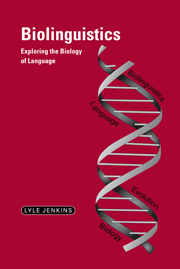Summary
A BRIEF CHRONOLOGY
Chomsky has posed what we consider to be the central questions for the study of language and biology (biolinguistics):
What constitutes knowledge of language?
How is this knowledge acquired?
How is this knowledge put to use?
What are the relevant brain mechanisms?
How does this knowledge evolve (in the species)?
Chomsky asks “how can we integrate answers to these questions within the existing natural sciences, perhaps by modifying them?” (Chomsky, 1991a:6). This more general question is part of what he has referred to as the unification problem, a topic to which we return below (Chomsky, 1994a:37,80).
The discussion of the questions (1)–(5) above within the tradition of generative grammar began in the early 1950s: “At least in a rudimentary form, these questions were beginning to be the topic of lively discussion in the early 1950s, primarily among a few graduate students. In Cambridge, I would mention particularly Eric Lenneberg and Morris Halle, and also Yehoshua Bar-Hillel” (Chomsky, 1991a:6).
The period between the mid-1950s and the present is sometimes referred to as the “cognitive revolution.” However, Chomsky has observed that contemporary work might be more properly viewed as a “renewal” of the “classical concerns” of the seventeenth and eighteenth centuries (Chomsky, 1997a). This earlier period of the study of mind, which includes as a central element the Cartesian theory of body and mind, might then be called the “first cognitive revolution” (Chomsky, 1994a:35). There are, in addition, many antecedents to modern-day studies of language and mind, both before and after this period.
- Type
- Chapter
- Information
- BiolinguisticsExploring the Biology of Language, pp. 1 - 14Publisher: Cambridge University PressPrint publication year: 2000



